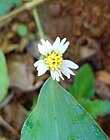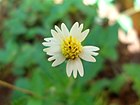Note: This is a project under development. The articles on this wiki are just being initiated and broadly incomplete. You can Help creating new pages.
Difference between revisions of "Tridax procumbens"
(→External Links) |
(→References) |
||
| (5 intermediate revisions by the same user not shown) | |||
| Line 2: | Line 2: | ||
'''Tridax procumbens''' is a herbaceous perennial plant with creeping stems up to 75cm long that become erect at their ends. The stems produce new roots at the leaf nodes. The plant is sometimes harvested from the wild for local use as a food and medicine. | '''Tridax procumbens''' is a herbaceous perennial plant with creeping stems up to 75cm long that become erect at their ends. The stems produce new roots at the leaf nodes. The plant is sometimes harvested from the wild for local use as a food and medicine. | ||
==Uses== | ==Uses== | ||
| − | {{Uses|Bronchial catarrh}}, {{Uses|Dysentery}}, {{Uses|Diarrhoea}}, {{Uses|Diabetes}}, {{Uses|Haemorrhoids}}, {{Uses|Bleeding}}, {{Uses|Sores}}, {{Uses|Ulcers}}.<ref name="Uses"/> | + | {{Uses|Bronchial catarrh}}, {{Uses|Dysentery}}, {{Uses|Diarrhoea}}, {{Uses|Diabetes}}, {{Uses|Haemorrhoids}}, {{Uses|Bleeding}}, {{Uses|Sores}}, {{Uses|Ulcers}}, {{Uses|Wound healing}}.<ref name="Uses"/> |
==Parts Used== | ==Parts Used== | ||
| Line 11: | Line 11: | ||
==Common names== | ==Common names== | ||
| − | {{Common names|sa=Kshudra sevantika, Jayanti veda|en=Coat buttons, Mexican daisy|gu=Ghaburi, Pardeshi bhangaro |hi=Kanphuli, Kumra|kn=ಅಟ್ಟಿಗೆ ಸೊಪ್ಪು Attige soppu, ಗಬ್ಬು ಸಣ್ಣ ಶಾವಂತಿ Gabbu sanna shaavanthi | + | {{Common names|sa=Kshudra sevantika, Jayanti veda|en=Coat buttons, Mexican daisy|gu=Ghaburi, Pardeshi bhangaro |hi=Kanphuli, Kumra|kn=ಅಟ್ಟಿಗೆ ಸೊಪ್ಪು Attige soppu, ಗಬ್ಬು ಸಣ್ಣ ಶಾವಂತಿ Gabbu sanna shaavanthi|ml=Cheeravanakk, Kumminippachcha|mr=Bandukiche phul, Dagadi paala|ta=Kinarruppacan, Vettukkaya-p-puntu|te=Gaddi chamanthi}}<ref name="Common names"/> |
==Properties== | ==Properties== | ||
| Line 36: | Line 36: | ||
===Flower=== | ===Flower=== | ||
| − | {{Flower||||}} | + | {{Flower|||||Flowering throughout the year}} |
===Fruit=== | ===Fruit=== | ||
| − | {{Fruit||||||}} | + | {{Fruit||||||Fruiting throughout the year}} |
===Other features=== | ===Other features=== | ||
| Line 75: | Line 75: | ||
<ref name="How to plant/cultivate">[http://tropical.theferns.info/viewtropical.php?id=Tridax+procumbens Cultivation]</ref> | <ref name="How to plant/cultivate">[http://tropical.theferns.info/viewtropical.php?id=Tridax+procumbens Cultivation]</ref> | ||
<ref name="Uses">Indian Medicinal Plants by C.P.Khare</ref> | <ref name="Uses">Indian Medicinal Plants by C.P.Khare</ref> | ||
| − | + | <ref name="Parts Used">”Karnataka Medicinal Plants Volume - 2” by Dr.M. R. Gurudeva, Page No.44, Published by Divyachandra Prakashana, #45, Paapannana Tota, 1st Main road, Basaveshwara Nagara, Bengaluru.</ref> | |
| − | <ref name="Parts Used"> | ||
</references> | </references> | ||
Latest revision as of 10:52, 3 April 2022
Tridax procumbens is a herbaceous perennial plant with creeping stems up to 75cm long that become erect at their ends. The stems produce new roots at the leaf nodes. The plant is sometimes harvested from the wild for local use as a food and medicine.
Contents
- 1 Uses
- 2 Parts Used
- 3 Chemical Composition
- 4 Common names
- 5 Properties
- 6 Habit
- 7 Identification
- 8 List of Ayurvedic medicine in which the herb is used
- 9 Where to get the saplings
- 10 Mode of Propagation
- 11 How to plant/cultivate
- 12 Commonly seen growing in areas
- 13 Photo Gallery
- 14 References
- 15 External Links
Uses
Bronchial catarrh, Dysentery, Diarrhoea, Diabetes, Haemorrhoids, Bleeding, Sores, Ulcers, Wound healing.[1]
Parts Used
Chemical Composition
It contains Thirty nine known alkaloids (mainly akuammidine, 68.756%), twenty three known flavonoids (mainly 17.593% kaempferol and 12.538% (−)-epicatechin) etc.[3]
Common names
| Language | Common name |
|---|---|
| Kannada | ಅಟ್ಟಿಗೆ ಸೊಪ್ಪು Attige soppu, ಗಬ್ಬು ಸಣ್ಣ ಶಾವಂತಿ Gabbu sanna shaavanthi |
| Hindi | Kanphuli, Kumra |
| Malayalam | Cheeravanakk, Kumminippachcha |
| Tamil | Kinarruppacan, Vettukkaya-p-puntu |
| Telugu | Gaddi chamanthi |
| Marathi | Bandukiche phul, Dagadi paala |
| Gujarathi | Ghaburi, Pardeshi bhangaro |
| Punjabi | NA |
| Kashmiri | NA |
| Sanskrit | Kshudra sevantika, Jayanti veda |
| English | Coat buttons, Mexican daisy |
Properties
Reference: Dravya - Substance, Rasa - Taste, Guna - Qualities, Veerya - Potency, Vipaka - Post-digesion effect, Karma - Pharmacological activity, Prabhava - Therepeutics.
Dravya
Rasa
Guna
Veerya
Vipaka
Karma
Prabhava
Habit
Identification
Leaf
| Kind | Shape | Feature |
|---|---|---|
Flower
| Type | Size | Color and composition | Stamen | More information |
|---|---|---|---|---|
| Flowering throughout the year |
Fruit
| Type | Size | Mass | Appearance | Seeds | More information |
|---|---|---|---|---|---|
| Fruiting throughout the year |
Other features
List of Ayurvedic medicine in which the herb is used
Where to get the saplings
Mode of Propagation
How to plant/cultivate
The plant is particularly well-adapted to coarse-textured soils.[6]
Commonly seen growing in areas
Dry locations, Especially sandy, Rocky sites like roadsides, Waste places.
Photo Gallery
References
- ↑ Indian Medicinal Plants by C.P.Khare
- ↑ ”Karnataka Medicinal Plants Volume - 2” by Dr.M. R. Gurudeva, Page No.44, Published by Divyachandra Prakashana, #45, Paapannana Tota, 1st Main road, Basaveshwara Nagara, Bengaluru.
- ↑ Chemical constituents
- ↑ Common names
- ↑ [Morphology]
- ↑ Cultivation
External Links
- Ayurvedic Herbs known to be helpful to treat Bronchial catarrh
- Ayurvedic Herbs known to be helpful to treat Dysentery
- Ayurvedic Herbs known to be helpful to treat Diarrhoea
- Ayurvedic Herbs known to be helpful to treat Diabetes
- Ayurvedic Herbs known to be helpful to treat Haemorrhoids
- Ayurvedic Herbs known to be helpful to treat Bleeding
- Ayurvedic Herbs known to be helpful to treat Sores
- Ayurvedic Herbs known to be helpful to treat Ulcers
- Ayurvedic Herbs known to be helpful to treat Wound healing
- Herbs with Leaves used in medicine
- Herbs with common name in Kannada
- Herbs with common name in Hindi
- Herbs with common name in Malayalam
- Herbs with common name in Tamil
- Herbs with common name in Telugu
- Herbs with common name in Marathi
- Herbs with common name in Gujarathi
- Herbs with common name in Sanskrit
- Herbs with common name in English
- Habit - Perennial
- Index of Plants which can be propagated by Seeds
- Index of Plants which can be propagated by Division
- Herbs that are commonly seen in the region of Dry locations
- Herbs that are commonly seen in the region of Especially sandy
- Herbs that are commonly seen in the region of Rocky sites like roadsides
- Herbs that are commonly seen in the region of Waste places
- Herbs





